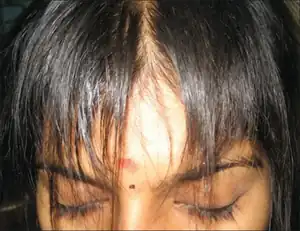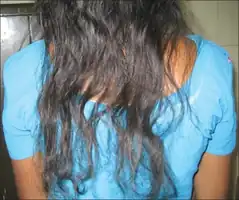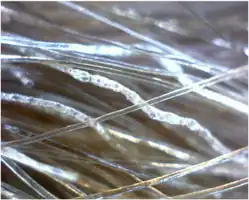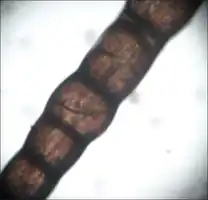Bubble hair deformity
| Bubble hair deformity | |
|---|---|
 | |
| Uneven broken, dry-looking hair following use of hair straightener | |
| Specialty | Dermatology |
| Symptoms | Short weak brittle hair, that feels rough[1] |
| Complications | Hair breaks easily[2] |
| Causes | Excess heat on wet hair, chemicals[3] |
| Risk factors | Hair dryers, hair straighteners, curling tongs[2] |
| Diagnostic method | Appearance, microscopy[3] |
| Prevention | Avoiding excessive heat and chemicals[2] |
| Frequency | Females>males[2] |
Bubble hair deformity is damage of the hair shaft, resulting in patches of short weak brittle hair, that feels rough.[1]
It is typically caused by chemicals and heat; temperatures greater than 125°C on wet hair, such as with the use of hair dryers, hair straighteners and curling tongs.[2] Bubble hair is characterized by rows of bubbles seen microscopically within localized areas of the brittle hair.[3] These air-filled spaces occur in the cortex of the hair shaft that correspond to the breakdown of keratin and local air expansion triggered by hot water passing through the shaft.[2] There may be an inherited predisposition.[4] It can be associated with trichorrhexis nodosa and trichoptilosis.[2]
Avoiding excessive heat and chemicals can prevent the condition.[2]
Bubble hair is more common in females.[2]
Signs and symptoms
Bubble hair deformity results in patches of short weak brittle hair, that feels rough.[1]
 Uneven broken, dry-looking hair
Uneven broken, dry-looking hair
Cause and mechanism
It is typically caused by chemicals and heat; temperatures greater than 125°C on wet hair, such as with the use of hair dryers, hair straighteners and curling tongs.[2]
Diagnosis
Diagnosis can be confirmed by microscopy.[3]
 Bubble hair
Bubble hair Spaces within hair shaft
Spaces within hair shaft
See also
References
- 1 2 3 Bhat, Yasmeen Jabeen; Sheikh, Gousia (2018). "13. Clinical bedside investigations". In Chandrashekar, B. S. (ed.). IADVL Textbook of Trichology. New Delhi: JP Medical Ltd. ISBN 978-93-5270-391-3. Archived from the original on 2023-06-30. Retrieved 2023-06-02.
- 1 2 3 4 5 6 7 8 9 10 Giacaman, A.; Ferrando, J. (1 February 2022). "[Translated article] Keys to the Diagnosis of Hair Shaft Disorders: Part I". Actas Dermo-Sifiliográficas. 113 (2): T141–T149. doi:10.1016/j.ad.2022.01.021. ISSN 0001-7310. PMID 35244576. Archived from the original on 20 April 2022. Retrieved 19 April 2022.
- 1 2 3 4 James, William D.; Elston, Dirk; Treat, James R.; Rosenbach, Misha A.; Neuhaus, Isaac (2020). "33. Diseases of the skin appendages". Andrews' Diseases of the Skin: Clinical Dermatology (13th ed.). Edinburgh: Elsevier. p. 766. ISBN 978-0-323-54753-6. Archived from the original on 2023-06-30. Retrieved 2023-06-02.
- ↑ "Defects of the hair shaft". dermnetnz.org. Archived from the original on 6 April 2022. Retrieved 18 April 2022.